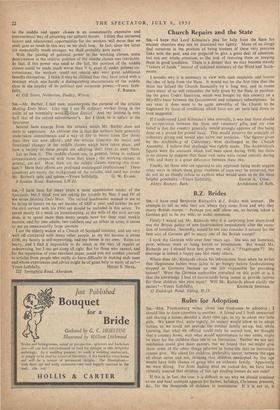SIR, —Mr. Barber, I feel sure, misinterprets the purpose of the
articles Making Ends Meet. Like hlm I am Wit ordinary worker living in the midst of an essentially workin-class district. And my income is only half that of the retired schoolmaster's. But I think he is unfair to the Spectator.
Several facts emerge from the articles which Mr. Barber does not seem to appreciate. An obvious one is that the authors have generally undertaken commitments and a way of life in better times (for them) than they can now afford ; and the articles illustrate the social and functional changes in the middle classes which have taken place, and how a variety of these people are adapting their lives to meet them.
Let us face it. The middle classes are, in general, living in reduced circumstances compared with those they knew ; the working classes, in general, are not. How, then, are the middle classes meeting this situa- tion ? Have their efforts any profound sociological implications ? These questions are surely the background of the articles, and need not evoke
Mr. Barber's spite and spleen.—Yours faithfully, G. W. EVANS. 9 Soudan Road, Battersea, S.W.11.






















































 Previous page
Previous page